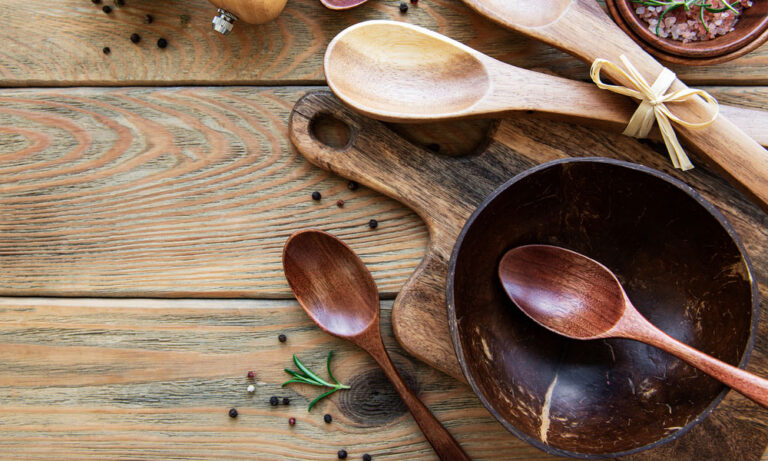In a society increasingly concerned with health and sustainability, the materials we use in our daily lives, particularly in the kitchen, have come under examination. Among them, choosing between hardwood and plastic utensils is very important. Wooden cookware, a traditional and environmentally beneficial option, is frequently considered as a good plastic alternatives. Here’s an in-depth look at why wooden cookware is not only healthier, but also a more responsible decision for your family and the planet.
- Healthier and Safer for Cooking
The natural composition of wooden cookware is one of the key reasons for its perceived health benefits over plastic. Plastics, particularly those used in kitchenware, can include chemicals such as Bisphenol A (BPA) and phthalates, which can leach into food when subjected to high temperatures. BPA is a synthetic molecule that mimics estrogen, potentially causing hormonal disturbances, reproductive difficulties, and an increased risk of some malignant tumors.
In contrast, wooden cookware is created from natural materials that are free of toxic chemicals. Wood does not emit toxins when in touch with hot food or cooking surfaces, making it a safer choice for stirring, mixing, and serving hot foods. This is especially crucial when cooking meals for youngsters or pregnant women, since they are more vulnerable to the negative effects of chemical exposure.
2. Antimicrobial Properties
Wood contains natural antibacterial characteristics that make it resistant to germs and other infections. According to research, certain varieties of wood, such as bamboo, maple, and oak, have self-sanitizing properties that efficiently neutralize microorganisms that come into touch with their surfaces. This is because wood is a porous substance, and germs that become caught in the pores are absorbed and eventually die when the wood dries.
In contrast, plastic cookware frequently develops grooves and scrapes over time, providing ideal conditions for germs to grow. Even after regular cleaning, these germs can remain in the tiny pores of plastic utensils, possibly contaminating food. The inherent antibacterial qualities of wood provide an extra layer of protection, resulting in a safer cooking environment.
3. Durability and Longevity
Wooden cookware is known for its toughness and endurance. Compared to plastic, which can fracture, melt, or distort over time, wooden utensils are more durable and can endure for many years with careful maintenance.
Furthermore, wooden kitchenware does not harm nonstick cookware, ensuring the longevity of your pots and pans. Plastic utensils, particularly when used at high temperatures, can melt or become deformed, releasing dangerous chemicals into your meal. In contrast, wooden utensils stay sturdy and durable, resulting in a longer lifespan and fewer replacements.
4. Reducing Microplastic Exposure
Wooden cookware is known for its toughness and endurance. Compared to plastic, which can fracture, melt, or distort over time, wooden utensils are more durable and can endure for many years with careful maintenance.
Furthermore, wooden kitchenware does not harm nonstick cookware, ensuring the longevity of your pots and pans. Plastic utensils, particularly when used at high temperatures, can melt or become deformed, releasing dangerous chemicals into your meal. In contrast, wooden utensils stay sturdy and durable, resulting in a longer lifespan and fewer replacements.
Microplastics, which are microscopic plastic particles formed by the degradation of plastic items, have become a rising source of worry in recent years. These microplastics have been discovered in the air, water, and food, suggesting possible health hazards. Plastic cookware contributes to this issue, particularly as it begins to decompose and emits microplastics into the environment.
Wooden cookware, being a natural material, does not contribute to microplastic contamination. By choosing wood as plastic alternatives you lessen your exposure to microplastics and contribute to their removal from the environment. This is not only good for your health, but also for the environment.
The distinction between wooden and plastic utensils extends beyond simple functioning. Wooden cookware has various advantages, including health safety, durability, and sustainability, making it the best option for people wishing to create a healthier kitchen environment. Choosing wooden as plastic alternatives not only protects your health, but also helps the environment and supports traditional craftsmanship. The next time you’re shopping for kitchenware, think about the long-term benefits of wood—it’s a choice that both you and the environment will appreciate.
“There is no such thing as ‘away’. When we throw anything away it must go somewhere.”
— Annie Leonard







